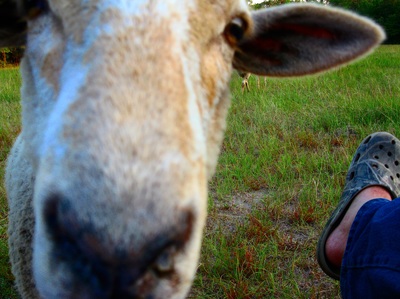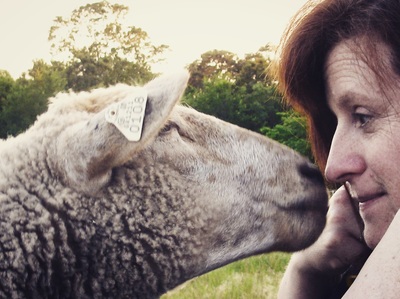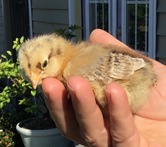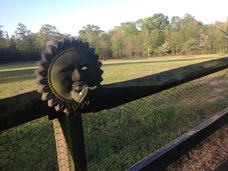The first ewe lamb was not born |
| |
Why would anyone start a farm? It is one thing to live in a farm-like place, as we have done for 13 years now, but it is quite another to try to turn a farm-like place into an actual working farm. This undertaking has required an outrageous quantity of research. Let’s raise animals. OK, which ones? There are so many choices, each with their pros and cons. Livestock guardian dogs? Sheep? OK, which breed? Which breeder? We’ll have to fly in a puppy from California?! And don’t get me started on the amount of research needed to start a business. Do you know the difference between a sole proprietorship and an LLC? I do now!
So why would I want to undertake this, especially since we are so busy already? I love to relax as much as the next person, but I find a lot of time spent “relaxing” doesn’t leave me feeling rejuvenated at all. Binge watching TV is fun in the moment, but I can’t recall a time when I turned off the TV and felt revitalized. More than half an hour of Facebook or surfing the Internet can be downright draining. But reading about sheep breeds invigorated me. Of all the ways you could spend your precious free time, what truly leaves you feeling recharged after a long week?
I also asked myself what I wanted more of in my life. Mary Oliver asks, “Tell me, what is it you plan to do with your one wild and precious life?” I don’t plan to spend too much of it glued to a screen. I decided I wanted a reason to be outside more. I wanted to be able to create something new with Charlie; when we put our very different talents together, amazing things happen. I wanted to challenge myself with something that scares me. (The idea of turning a lamb around in a birth canal if needed is daunting, believe me.)
And I hoped to do something that would make a difference somehow, and I think this undertaking can do that. I believe in small farms and building local communities. We don’t have the space to have a very large operation, but we can provide exceptional livestock and livestock protection to others who are trying to homestead or feed their communities or create amazing fiber art. We can build the infrastructure of this farm and the quality of its soil and forage so that a future generation of farmers can benefit from it. We can serve as an example to others who might want to move to the country or bring the country to their backyards. We can use this as an opportunity to raise awareness about critically endangered breeds, and how you don’t need to be a farmer to help them. And maybe best of all, we can demonstrate that if you want to do some crazy thing, maybe just do it. We’re from suburban Atlanta for heaven’s sake! But why not us? Why not you?
So after months of spending my free time researching all-things-farm, do I feel revitalized? Yes I do.
Why would anyone start a farm? It is one thing to live in a farm-like place, as we have done for 13 years now, but it is quite another to try to turn a farm-like place into an actual working farm. This undertaking has required an outrageous quantity of research. Let’s raise animals. OK, which ones? There are so many choices, each with their pros and cons. Livestock guardian dogs? Sheep? OK, which breed? Which breeder? We’ll have to fly in a puppy from California?! And don’t get me started on the amount of research needed to start a business. Do you know the difference between a sole proprietorship and an LLC? I do now!
So why would I want to undertake this, especially since we are so busy already? I love to relax as much as the next person, but I find a lot of time spent “relaxing” doesn’t leave me feeling rejuvenated at all. Binge watching TV is fun in the moment, but I can’t recall a time when I turned off the TV and felt revitalized. More than half an hour of Facebook or surfing the Internet can be downright draining. But reading about sheep breeds invigorated me. Of all the ways you could spend your precious free time, what truly leaves you feeling recharged after a long week?
I also asked myself what I wanted more of in my life. Mary Oliver asks, “Tell me, what is it you plan to do with your one wild and precious life?” I don’t plan to spend too much of it glued to a screen. I decided I wanted a reason to be outside more. I wanted to be able to create something new with Charlie; when we put our very different talents together, amazing things happen. I wanted to challenge myself with something that scares me. (The idea of turning a lamb around in a birth canal if needed is daunting, believe me.)
And I hoped to do something that would make a difference somehow, and I think this undertaking can do that. I believe in small farms and building local communities. We don’t have the space to have a very large operation, but we can provide exceptional livestock and livestock protection to others who are trying to homestead or feed their communities or create amazing fiber art. We can build the infrastructure of this farm and the quality of its soil and forage so that a future generation of farmers can benefit from it. We can serve as an example to others who might want to move to the country or bring the country to their backyards. We can use this as an opportunity to raise awareness about critically endangered breeds, and how you don’t need to be a farmer to help them. And maybe best of all, we can demonstrate that if you want to do some crazy thing, maybe just do it. We’re from suburban Atlanta for heaven’s sake! But why not us? Why not you?
So after months of spending my free time researching all-things-farm, do I feel revitalized? Yes I do.
Cynthia Alby
I have a farm, work as a professor of English education, and have an undergraduate degree in philosophy. Add that up and you get philosophical writing on farming. Enjoy!
Archives
February 2019
August 2017
November 2016
August 2016
July 2016
May 2016
April 2016






 RSS Feed
RSS Feed
